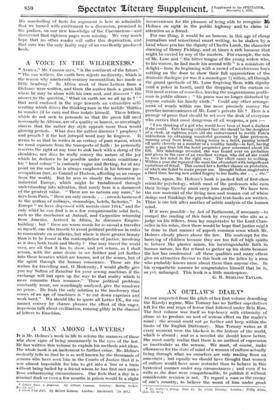A MAN AMONG LAWYERS.t
TT is Mr. Holmes's work in life to reform the manners of those who show signs of being unmannerly in the eyes of the law. He has written this volume to explain his methods and ideas. The whole book is an incitement to further crime. Mr. Holmes modestly tells us that he is so well_known by the thousands of persons who have seen him in the Courts of Justice that it is sow almost impossible for him to get into a 'bus or a train without being hailed by a friend whom he has first met under those embarrassing circumstances. One feels that a day in a criminal dock or even a few months in prison would be a slight
• Leiters from a Distance. By Gilbert unman. London : Martin Seeker. 105.6d. twt.1 . t Them That Fall. By ncoert Eulmes. London : Blackwood. [3s. net.]
inconvenience for the pleasure of being able to recognize Ns Holmes on sight in the public highway and to claim hi attention as a friend.
For one thing, it would be an honour, in this age of cheap journalism and sensational smart writing, to be shaken by a hand whose pen has the dignity of Charles Lamb, the character drawing of Henry Fielding, and at times a rich humour that might be envied by any of the masters. For example, the tale of Mr. Lane and " the bitter tongue of the young widow who, to his sorrow, he had made his second wife " is a miniature of delight—from its beginning with a crowd of mischievous boys rattling on the door to show their full appreciation of the domestic duologue (or was it a monologue ?) within, all through the grand spectacle of Mr. Lane forgiving them with dignity (and a poker in hand), until the dropping of the curtain on this most serious of comedies, leaving the magnanimous gentle- man in public silence : " his peace was no longer disturbed by anyone outside his family circle." Could any other arrange- ment of words within one line more precisely convey the peculiar inconveniences of Mr. Lane's private life ? Here is a passage of prose that should be set over the desk of everyone who carries that most dangerous of all weapons, a pen :—
" I am thinking of a girl who would have been at least a duchess if she could. Fate having ordained that she should be the daughter of a clerk, at eighteen years old she endeavoured to rectify Fate's unkindness by obtaining wonderful garments by false pretences, running away from home, taking rooms in a hotel, passing herself off quite cleverly as a member of a wealthy family—m fact, having quite a gay time till the hotel proprietor grew concerned about his bill. Her misdoings revealed, she was bound over on probation and given to the care of an excellent woman, who did all she could to turn her mind in the right way. The effort came to nothing. Within a year she repeated the same line of conduct with insignificant variations of detail. This earned her a further chance on probation, of which she failed to make proper use. Brought before magistrates a third time, having now added forgery to her faults, she . . ., etc."
Then, again, Mr. Holmes's book is packed full of first-class. scientific psychology, which most of the professors who earn their livings thereby must envy him greatly. We have here the raw material of the living men and women out of whose doings and thinkings the psychological text-books are written. There is one tale after another of subtle analysis of the human mind.
If it were possible—by Act of Parliament, if necessary—to compel the reading of this book by everyone who sits as a judge on his fellows, from lay magistrates to the Lord Chan- cellor in his robes, then there would be hope that justice might be done in that manner of superb common sense which Mr. Holmes clearly places above the law. His contempt for the harrying of children because they are too full of high spirits to behave like plaster saints, his inextinguishable faith in human nature, his flat refusal to gather up his skirts because the law has condemned—all these qualities and many others give an attractive flavour to this book on the fallen by a man who probably knows more about them than anyone else. In his sympathetic manner he congratulates himself that he is, as yet, unhanged. This book is a little masterpiece.
G. R. STIRLING TAYLOR.


























































 Previous page
Previous page